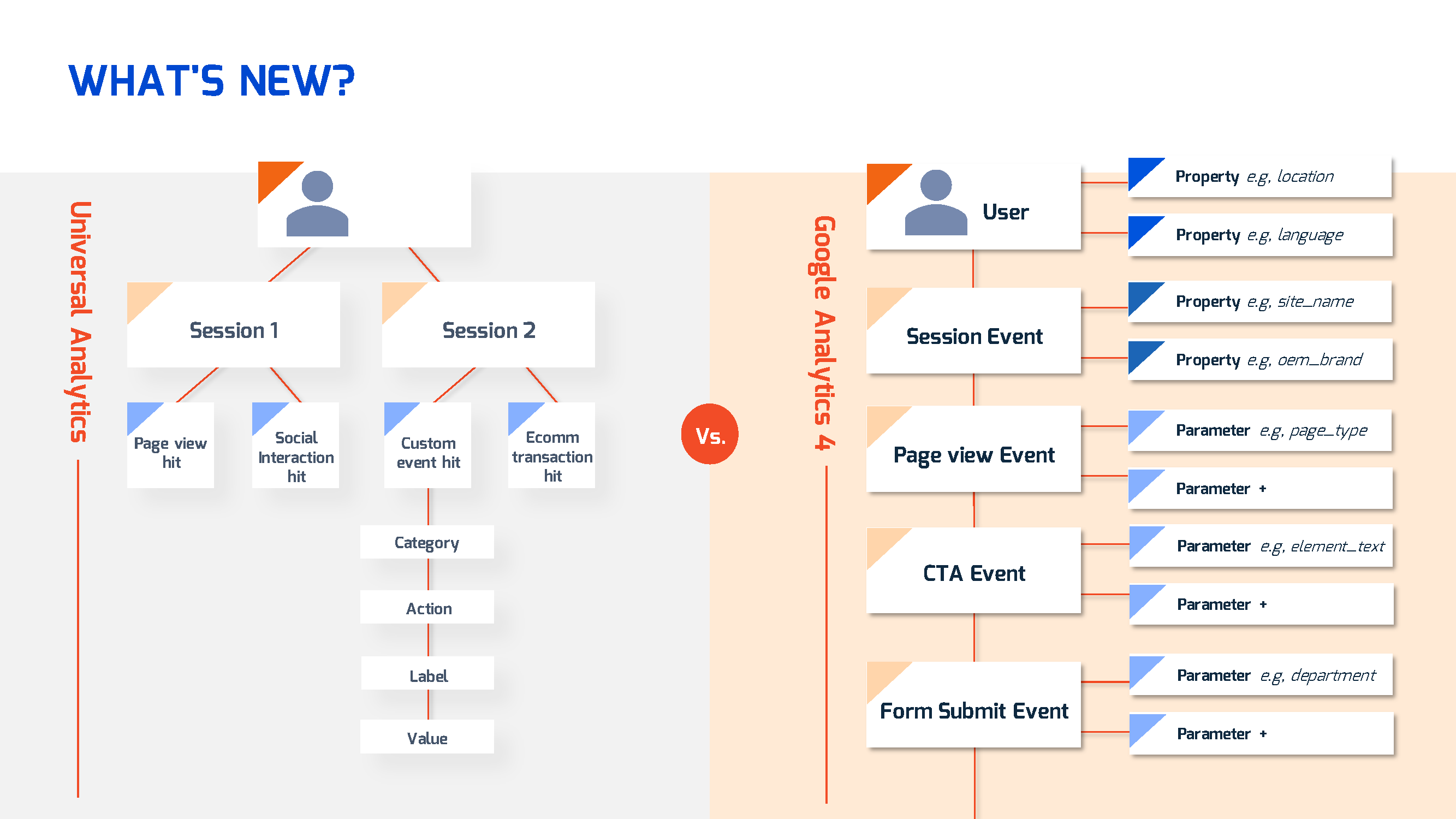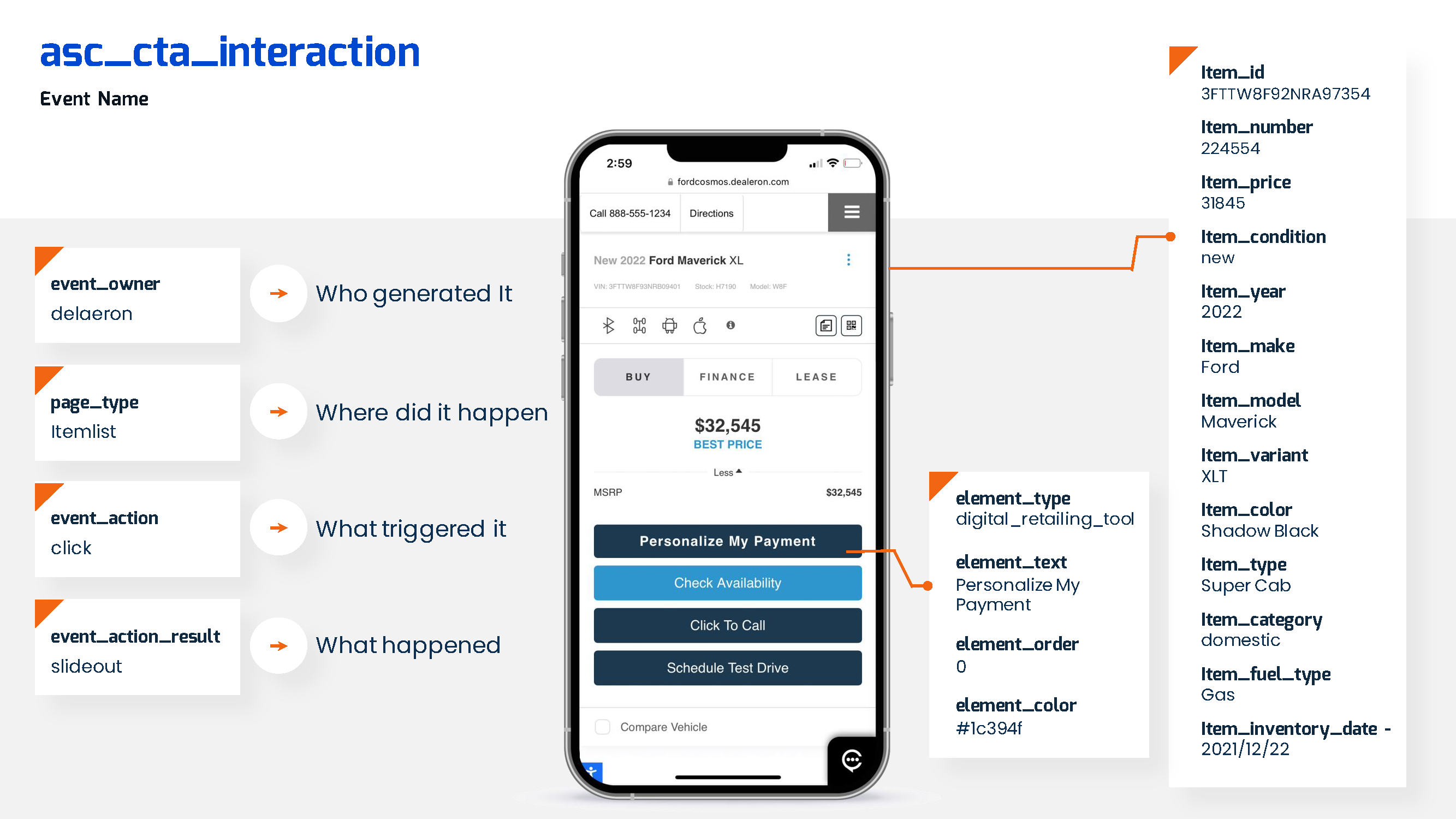

Major changes are coming to your website reporting starting July 1, 2023, with the official switchover to Google Analytics 4 from Universal Analytics. The change represents a seismic shift in the reporting landscape for dealerships. We dive into what your dealership can expect from the all-new Google Analytics 4 in this edition of DealerOn University.

Google Analytics 4 ushers in a new era of website reporting and metrics for dealerships
Preparing for Google Analytics 4
Your website analytics are about to change, as on July 1st, Google is replacing Universal Analytics (possibly more familiar to you as Google Analytics 3 or GA3) with a new version, called Google Analytics 4, or more simply GA4. This is less of an update as a complete overhaul and will dramatically impact how you track website performance.
Why the Change?
The digital landscape changed and to reliably track how users interact with your web presence, analytics had to follow suit. Most web browsing is done via mobile devices on the go, and even then, sometimes a single session will unfold over multiple devices. Recent laws designed to protect user privacy have banned cookies. GA4 was designed to adapt to both these and other minor changes while delivering accurate data.
Upgrading to GA4
Good news. GA4 is the default version of Google Analytics, so if you’re setting it up for the first time, this is the version you get. If you’re still running UA, you can still use it for the time being, but it is no longer supported.
If you’re already a DealerOn client, you don’t need to worry. You’re fully prepped for the GA4 switchover and can take advantage of the new functionality starting July 1st. If you’re not a DealerOn client, you’ll need to speak with your website provider about migrating to GA4.
Event-based Reporting
The biggest change in the shift from Universal Analytics to GA4 is that Universal Analytics was Session-based, while GA4 is Event-based. Events are user interactions with your web properties, and although they were available in UA, their scope and functionality were limited.

In UA, the data you could pull from individual events was generally limited to secondary dimensions and the pre-built Category, Action, Label, Value format. GA4 comes with a variety of event types and a nearly unlimited number of customization options available for each event in the form of “Parameters”. Parameters provide added context for individual events and are a key aspect of reporting in GA4.
GA4 has 4 different event types used for reporting:
- Automatically Collected Events are automatically collected when your GA4 is set up
- Enhanced Measurement Events are automatically collected but can be enabled/disabled depending on your preference and needs
- Recommended Events are events recommended by Google depending on industry
- Custom Events are user-created events and are the most important event category, as these will allow engagement tracking on every unique element of your website such as your inventory, forms, multimedia, and anything else you need to track
Automotive Standards Council
The Automotive Standards Council (ASC) is a standardized analytics reporting system developed by industry leaders in the automotive retailing space, including our team at DealerOn.
The goal of the ASC is to provide automotive retailers with standardized event tracking so that they can easily and accurately compare and report on data between all their properties. That means any vendor or third-party adhering to the ASC specifications will be sending the exact same events, with the same associated parameters, to all of their automotive clients.
The goal of the ASC is to provide automotive retailers with standardized event tracking so that they can easily and accurately compare and report on data between all their properties.
DealerOn is proud to be a founding member of the ASC and will continue to adhere to the standards and contribute to their improvement in the coming years. If you’re not a DealerOn client, you’ll need to speak with your website vendor about using the ASC specification in your website reporting.
ASC Standardized Events
When your website takes advantage of the ASC specification, you gain access to a wide variety of events and parameters within each event. Every event that can happen on a page is covered in the ASC specification, while maintaining a minimal number of unique events.
Each of these events comes with a wide variety of parameters that tell you:
- Who generated them
- What type of page they were on
- How the event was triggered
- The customer experiences the event resulted in
Below you will find an example of one event for a CTA (Call-to-Action) interaction. With the ASC event you will be able to instantly understand more about the CTA itself with element text, order, and color information. When an item (item is the ASC standard label for vehicle) is involved, you will have access to a huge “item block” which opens VIN level reporting through the item_id parameter.

These are just a few examples of the type of granular, standardized data you receive when using ASC compliant analytics. Read our in-depth analysis of the ASC specification and what it means for dealerships in our ASC articles:
- Context and history of GA4 and the ASC: Standardized Google Analytics Have Arrived (Part 1)
- How the ASC affects vendors and best practices: Standardized Google Analytics Have Arrived (Part 2)
Property “Views” Are Gone
The days of having multiple views per property, with filters and goals to manage for each, are gone. In GA4 all your website data comes through what is known as a “Data Stream”. These data streams will be the source of truth for each of your properties.
One great benefit of this new system is the ability to have “Roll-up” properties. Roll-up properties are GA4 properties that use multiple data streams from different websites (and Web/iOS/Android applications if you happen to have them). This allows you to track website performance and engagement from multiple properties in one account.
Roll-up properties will be especially useful for group dealers who need to track the performance of all the stores in one region or compare specific OEM stores by location.
Goals Are Replaced by Conversions
In UA, website conversions were tracked as “Goals”. You would set up a goal for your website, such as a user landing on a Thank You Page from a form fill, and that would be counted as a website conversion.
Since GA4 is event-based, once you have your events set up within GA4, you can choose which of those events you want to classify as conversions. All you need to do is go to your Events page and toggle on “Mark as conversion” for each event you want to classify as a conversion.
Ready to supercharge your search rankings?
Schedule your demo and we’ll show you how our SEO experts can boost your dealership to the top of search results!
A New Era of Metrics
GA4 concentrates on metrics such as engagement rates and engaged sessions. As any digital marketer will tell you, engagement is the primary focus of your site. Measuring an engaged viewer is far more valuable than a session duration, especially in the era of having a hundred website tabs open that are forgotten about. These new metrics get to the root of what you want your site to do—namely generating leads via targeted interaction—enabling you to focus your efforts on what makes your site effective.
Metrics in UA were largely built on pageviews, but as we detailed earlier, GA4 has shifted tracking focus to events. The idea is that it doesn’t matter how much a site is viewed if that’s all that happens. Interaction is the purpose, and so that is what is tracked. GA4 will track multiple conversion events even if they occur in the same session.
GA4’s new metrics are perhaps of most interest to marketing professionals:
- Active Users: Measures the full number of users in a 28-day period
- Engaged Sessions: Sessions lasting longer than 10 seconds or had at least 2 views
- Engagement Rate: The percentage of total sessions that were engaged
- Average Engagement Time: Measures engagement durations per active user
- Event Count: Tallies the number of triggered events or hits
Predictive Metrics
The AI-powered capabilities of GA4 offer predictive metrics such as churn probability and purchase probability. This allows marketers to identify high-value segments for re-engagement campaigns or predict future revenue from a particular group of customers, optimizing marketing strategies accordingly.
Advanced Audience Segmentation
GA4 provides more advanced audience segmentation capabilities. It allows marketers to create audience segments based on a combination of demographics, behavior, and technology usage, which can help to target marketing efforts more effectively.
New Attribution Models
To properly track interactions that are ultimately responsible for a conversion, GA4 has two basic attribution models. The first is data-driven, which distributes credit for conversion based on channel data for each conversion event. It uses your account’s data to calculate the contribution of each click. This offers unparalleled analysis of the path your users take from their first click to conversion.
Alternately, you can use cross-channel rules-based models, which have several formats:
- Last-click: Attributes a conversion to the last channel with an engagement
- First-click: Attributes a conversion to the first channel with an engagement
- Linear: Distributes conversion credit evenly to all channels
- Position-based: Gives 40% to first and last, then splits the remaining 20% among the middle channels
- Time delay: Applies credit the closer the channel is to conversion on a 7-day half-life
- Ads-preferred: Gives all credit to the last Google Ad a user clicked
DealerOn is Ready for GA4
GA4 is an upgrade that will fundamentally change how you track your website performance. If you’re already a DealerOn client, your Customer Success Manager will be happy to walk you through the changes and show you how to best take advantage of them.
Not a DealerOn client? Schedule your DealerOn demo today. We’re proud to be on the forefront of analytics and reporting by delivering innovative solutions for automotive retailers. Our clients have all the data they need to succeed in a rapidly changing market.


